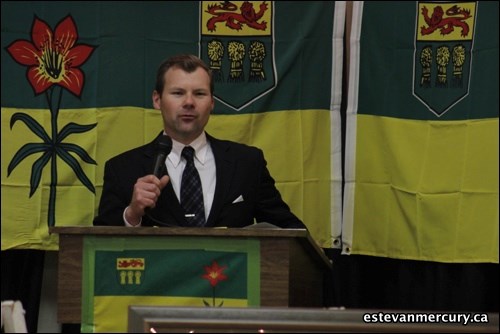With the health minister appearing as the guest speaker at MLA Doreen Eagles' fundraising dinner last week, it was the Energy City's health-care needs that took centre stage.
The guest speaker was Dustin Duncan, Weyburn-Big Muddy MLA, addressing the room of about 160 who attended at the Elks Hall, and he noted some initiatives of the provincial government like their Growth Plan and using Lean principles in the health-care system. After the auction that ended the evening, Duncan answered a few more questions from the media.
When asked about the possibility of a CT scanner in Estevan, he said there are a number of options that could be looked at. A permanent CT scan is maybe the most attractive option, Duncan said, while noting there are other health regions that have district or regional hospitals that would also be good candidates for the equipment.
"One of the options could be a mobile unit that would go from place to place," he said but added he doesn't see it as the best course. "The difficulty with that is obviously with equipment that is pretty precise. There's a lot involved with transport and recalibrating equipment like that, so I'm not sure that's a real feasible option."
Duncan spoke with local health officials who are interested in bringing a CT scanner to St. Joseph's Hospital.
"It's something I know has been pushed forward to the health region and the ministry. Certainly, I'm not here this evening to make a commitment on the CT scanner for Estevan," Duncan said.
He did say, however, that he is planning to come back for more formal meetings on the issue.
As for a timeline, he said that it will depend on budget deliberations with the treasury board.
"It all has to be done within the confines of the health budget and with the other priorities within other health regions as well," said Duncan. "Those are all factors that go into weighing whether or not we would proceed with something like a CT scanner for Estevan."
Duncan noted that health ministers in all provinces across Canada are involved in a health initiative, with Saskatchewan Premier Brad Wall as its chair, and they are tasked with identifying some things that can be done together to help lower costs for pharmaceuticals, as the shortage of generic drugs continues to be a national issue.
"On the generic side, we are actually co-leading that with the province of Alberta to look at ways to be able to drive the costs down," he said. "What we need to keep in mind moving forward is we want to make sure we don't, as an unintended consequence, do more harm to the system in terms of putting at risk the supply of generic drugs. We're going to go about it in a pretty thoughtful way."
He said they will have a plan to present to health ministers across the country next year, recommending the five or six drugs that everybody needs to buy.
"Maybe we'll be able to do it in a fashion that will drive some of the prices down, while ensuring that we don't do anything that's going to be harmful to the supply."
As far as ballooning health costs, with the government spending $4.6 billion and 43 per cent of the provincial budget, he said much of what they can do leads to one-time savings.
How they inventory blood and vaccines now makes initial savings but won't have long-term impacts.
"What we found there wasn't really a consistent way to ensure we're embedding that into the system," said Duncan. "We're just seeing these one-offs."
He said they are pushing the Lean principles as much as they can, finding efficiencies in the system that focus on improving the patient experience. He noted about 70 per cent of health-care costs go towards salaries, so it's the other 30 per cent of costs where they are hoping to find these efficiencies.




